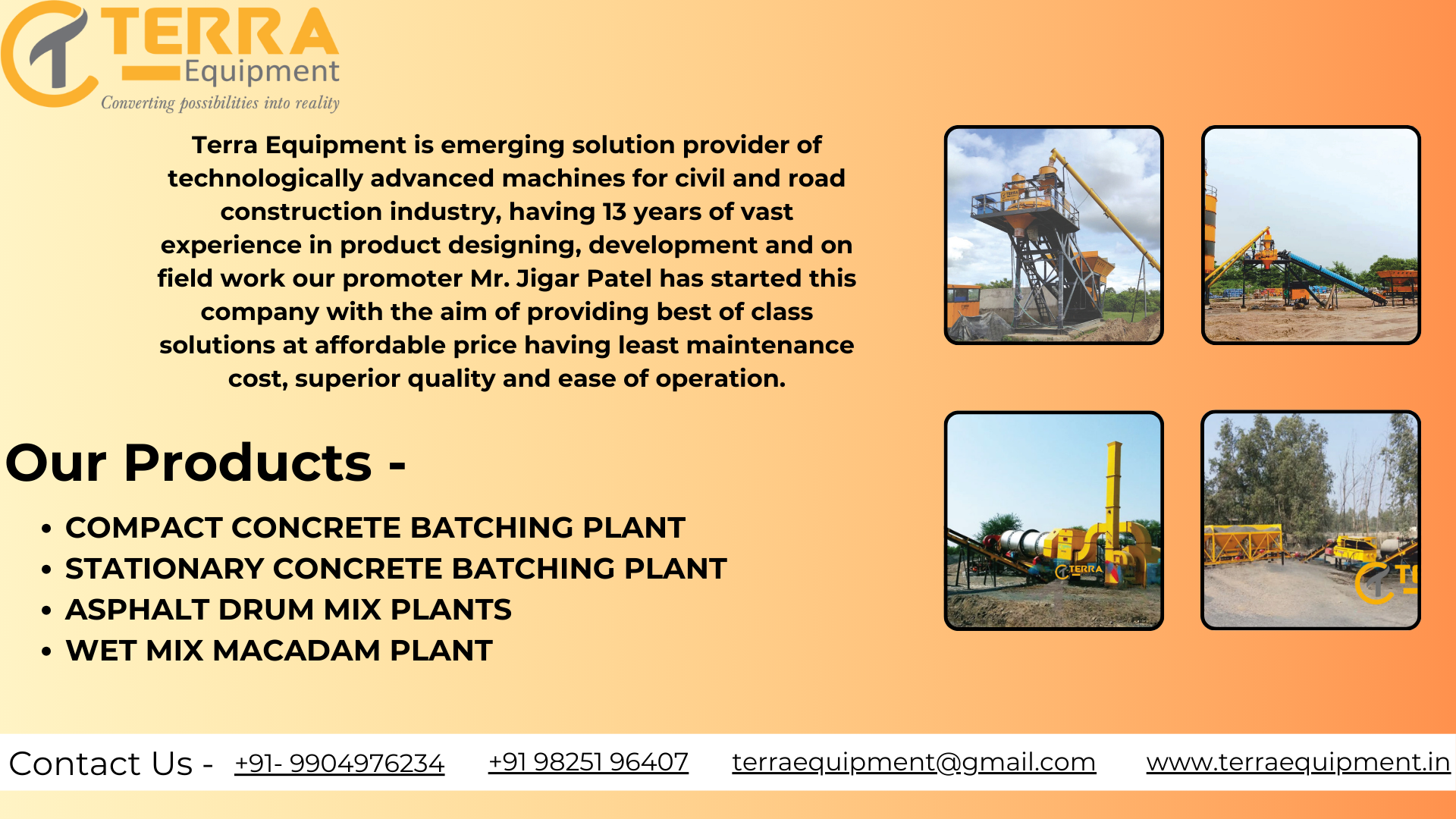Concrete Batching Plant Cost in India
Description
A Concrete Batching Plant is a facility or equipment that blends various ingredients like cement, water, sand, aggregates, and admixtures to produce concrete in large quantities. It is the heart of modern construction projects, providing ready mix concrete (RMC) efficiently and accurately.
Concrete batching plants are available in different types:
-
Stationary Batching Plants
-
Mobile Batching Plants
How It's Made:
The manufacturing of a concrete batching plant involves precision engineering, automation integration, and robust construction materials. Here’s how it’s typically made:
-
Steel Frame Structure:
Heavy-duty steel is used to make the base and structural frames. Aggregate Storage Bins & Conveyors:
Multiple bins are installed for sand, gravel, and crushed stones. Belt conveyors transfer the material to the mixer.-
Cement Silo Fabrication:
Storage tanks (silos) are fabricated from steel sheets and fitted with level sensors. -
Weighing Systems:
Load cell-based electronic weighing systems ensure accurate measurement of materials. -
Control System Installation:
A PLC-based automatic control panel is integrated to control the entire batching and mixing process. -
Mixer Assembly:
The central mixing unit could be a twin-shaft mixer, pan mixer, or planetary mixer depending on capacity.
Where It’s Used:
-
Ready Mix Concrete Plants (RMC suppliers)
-
Highways and Bridges
-
Metro Projects
-
Dam and Irrigation Projects
Residential Housing Projects
-
Precast Concrete Manufacturing Units
-
Airports and Runways
Key Features:
Mixer Type: Twin-shaft, Planetary, or Pan mixer
-
Storage Silos: 1 to 4 compartments for cement and fly ash
-
Control Panel: PLC/SCADA with touch screen
-
Automation Level: Fully automatic, semi-automatic, or manual
Aggregate Bins: 2 to 4 compartment bins
-
Discharge Height: Adjustable up to 4 meters
-
Load Cell Weighing: For aggregates, cement, water, and admixtures
Importance in the Construction Industry:
Increases speed of construction
-
Minimizes labor dependency
-
Allows year-round production
-
Reduces material wastage
-
Vital for mass construction projects
Advantages:
-
High Productivity:
Can produce large volumes of concrete continuously. Accuracy in Mixing:
Electronic weighing and computer-controlled batching ensure quality.-
Time-Saving:
Reduces on-site mixing delays and increases work speed. Cost-Effective:
Minimizes manual errors, overuse of materials, and transportation cost.-
Environment Friendly:
Enclosed systems reduce dust and noise pollution. -
Adaptability:
Plants can be customized based on site space and project needs. -
Portability (for mobile type):
Mobile batching plants are easily transportable and quick to set up.
Concrete Batching Plant Cost in India:
Type |
Approximate Cost (INR) |
|---|---|
| Mini Batching Plant (15–30 m³/h) | |
| Stationary Plant (30–60 m³/h) | ?18 – ?30 Lakhs |
| High-Capacity (75–120 m³/h) | ?35 – ?55 Lakhs |
| Mobile Batching Plant | ?15 – ?28 Lakhs |
| Fully Automatic Plant |
Why to Choose a Concrete Batching Plant?
Customizable Design for Any Site
-
High-Quality Consistent Concrete
-
Easy to Maintain
-
Built for Rugged Indian Conditions
Essential for Competitive Construction Projects
10 Most Asked FAQs:
-
Q: What is the main purpose of a batching plant?
A: To produce high-quality concrete by accurately batching and mixing ingredients. -
Q: How long does it take to install a concrete batching plant?
A: Stationary units take 1–2 weeks; mobile plants can be installed in 2–3 days. Q: What type of mixer is used in batching plants?
A: Typically twin-shaft or pan mixers, depending on the plant type and concrete requirement.-
Q: Is automation necessary in a batching plant?
A: For accuracy and speed, fully automatic systems are highly recommended. -
Q: Can the plant be relocated?
A: Mobile and skid-mounted plants can be easily relocated. -
Q: Is a concrete batching plant suitable for rural projects?
A: Yes, especially compact or mobile plants are ideal for remote or rural areas. -
Q: What is the life expectancy of a batching plant?
A: With proper maintenance, 10–15 years or more. Q: Do batching plants come with silos?
A: Yes, most setups include cement and fly ash silos.-
Q: How much area is required for setup?
A: Ranges from 2000 sq. ft. (mini plant) to 10,000 sq. ft. (large stationary plant). Q: What certifications are required for operation?
A: Generally, a pollution control certificate and local municipal clearance may be needed.
Conclusion:
In today’s construction landscape, a Concrete Batching Plant is not just an option—it’s a necessity. It provides precise, fast, and scalable concrete production that meets project deadlines and ensures quality. Whether you are a contractor, builder, or RMC supplier, investing in the right batching plant improves efficiency, reduces costs, and enhances your construction output. The upfront cost is quickly recovered through savings in time, labor, and material.
Contact:-+91-9825196407 , +91-9825196407
Gmail:-terraequipment@gmail.com
Website:-https://terraequipment.in/

